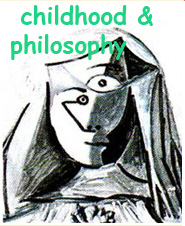el programa de filosofía para niños de matthew lipman: uma concepción liberal de la educación
Resumen
El presente artículo pretende demonstrar que el Programa de Filosofía para Niños, de Matthew Lipman, se fundamenta en una concepción liberal de la relación entre educación y sociedad, concepción de la cual se desprende el carácter idealista y “no-crítico” de su pedagogía. Para eso, se presenta inicialmente una breve caracterización de esa concepción, enfatizando la “misión redentora” y de ecualización social por ella confiada a la escuela. Enseguida, se procede a una descripción resumida de algunos de los principales aspectos constitutivos del Programa de Lipman para, posteriormente, explicitar la forma en la cual incorpora el ideario liberal de la educación como “redentora”. Finalmente, se discuten algunas de las implicaciones políticas e ideológicas de esa incorporación. Cabe aclarar que la reflexión aquí presentada no se refiere a ninguna de las prácticas actuales de filosofía con niños, sino a las posiciones del propio Lipman expresadas, fundamentalmente, en dos de sus obras más importantes: La filosofía va a la escuela y Pensar en educación. Palabras clave: filosofía para niños; enseñanza de la filosofía; filosofía y educación; Matthew LipmanDescargas
Los datos de descargas todavía no están disponibles.
Descargas
Publicado
2011-06-26
Cómo citar
SILVEIRA, Renê josé trentin. el programa de filosofía para niños de matthew lipman: uma concepción liberal de la educación. childhood & philosophy, Rio de Janeiro, v. 7, n. 13, p. pp.121–139, 2011. Disponível em: https://www.e-publicacoes.uerj.br/childhood/article/view/20582. Acesso em: 12 jul. 2025.
Número
Sección
artículos
Licencia
el copyright de cada artículo pertenece a cada autor. childhood & philosophy tiene el derecho a la primera publicación. el permiso de reimprimir cualquier artículo que haya aparecido en la revista necesita de la autorización escrita del autor. en adisión a cualquier forma de reconocimiento requerido por el autor el siguiente aviso debe ser añadido a la declaración de permiso en la reimpresión (con los números apropiados a los puntos suspensivos): [título del artículo] fue publicado originalmente en la infancia y la filosofía, tomo ..., número ..., pp. ...-...




